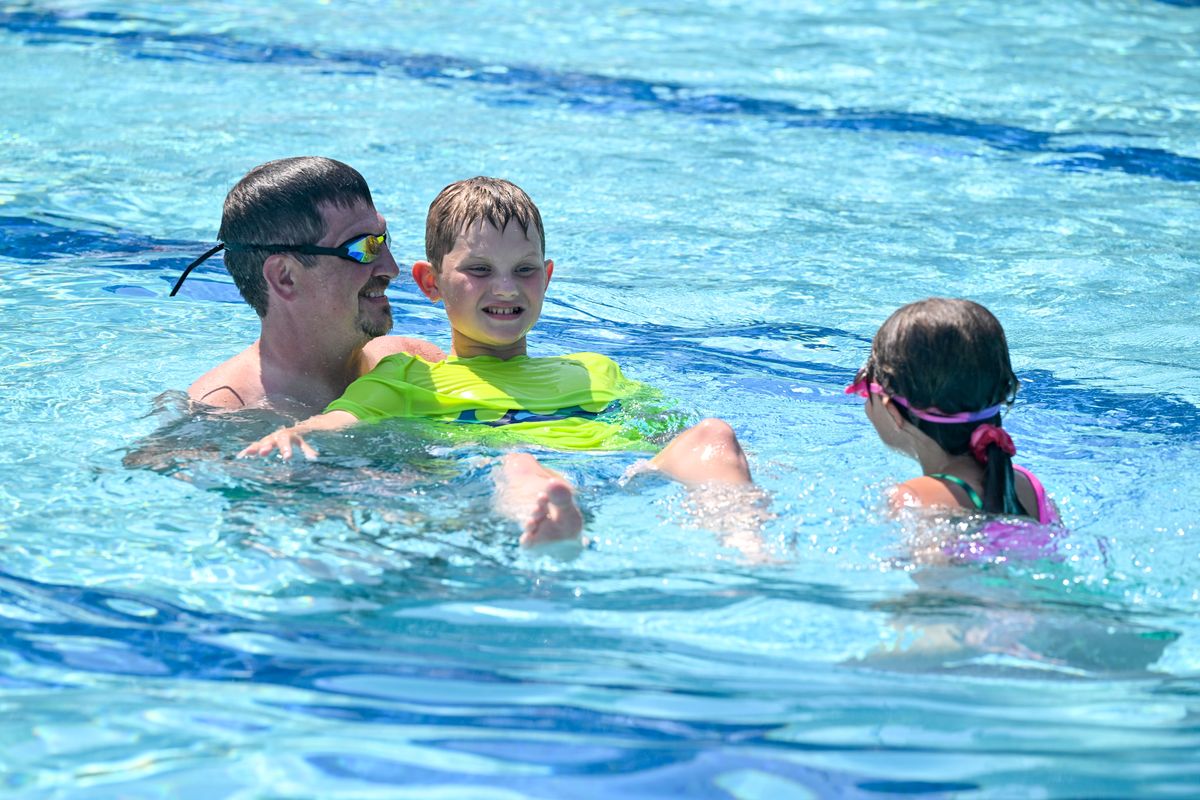At Cannon hill pool, sensory-sensitive kids thrive

Many Spokane families are seeking refuge in the city’s public pools as the region’s brutal heatwave continues.
Friday was no exception, as eight local families swam at the A.M. Cannon Aquatic Center in an afternoon spent with friends under the sun.
One thing was different, though: The pool was holding one of its special sensory-friendly swim events.
From noon to 12:45 p.m. Friday, the aquatic center saw fewer crowds, whistles used with less frequency, and zero-depth pool entry, slides and play structures.
Designed for individuals with sensory sensitives – including those who are on the autism spectrum or have other forms of neurodivergence – the program seeks to create a sensory-friendly environment at the city’s pool.
“The program gives (sensory-sensitive kids) the ability to be like every other kid, because they’re surrounded by their peers, without the stigma of being looked at,” said local parent Scott Gordon, who helped get the program going.
The city took inspiration from similar sensitive-friendly programs at the Spokane County Interstate Fair and Flying Squirrel trampoline park, said Alice Busch, the therapeutic recreation services manager with the Parks and Recreation Department.
A public pool with hundreds of people, sharp whistles, loud voices and lots of movement can be uncomfortable for anyone, but especially for those with sensory sensitivity.
“(Many families) haven’t been to a pool in years, because it just wouldn’t work,” she said, “It was just too overwhelming.”
When approached by Gordon, Busch took the jump.
“I’ve been wanting to do this for years, and I’ve just never acted on the idea,” she said.
Bush and Gordon collaborated with the city’s aquatic department to create the pilot program – four weeks, 45 minutes of swimming every Friday, the aquatics center’s pool adapted for sensory-sensitive swimmers.
The program is not without its complications.
The aquatic center is a private pool, and “Time is very expensive,” Busch said. Five to seven aquatic staff members must be on the pool deck at any time. Private pool time for one hour, she said, is around $400 to operate the facility. For that reason, the pilot program is hosting a limited number of participants.
Concerns quieted Friday, as the kids and parents alike had a “hysterically” fun time, according to Gordon.
“Kids and adults with disabilities can feel overwhelmed by crowds,” he said, “or just feeling out of place by the simple act of being looked at because of their disability.”
Gordon’s daughter Chloe, 14, has autism and is nonverbal. He initially approached Bush with the sensory swim idea and continues to champion the program.
“It was very satisfying to see Chloe being able to enjoy herself, (and) be in a group where she’s not stigmatized,” he said.
Feedback was overwhelmingly positive, Busch said.
Friday was the second session of Sensory Sensitivity Swim, which is still in its piloting phase. Already, Busch and Spokane Parks and Recreation are expanding the swim time: Seeing parents in the Friday program bring the whole family, Busch “hurried” to create a companion class – a way for parents to get tickets for all their children to enjoy sensory swim.
Sensory Sensitivity Swim is joining an array of programs the Parks and Recreation department offers with its Therapeutic Recreation Services.
“This is just one great example of a variety of therapeutic recreation services programs that our city offers,” said Fianna Dickson, the communication manager for the city’s Parks and Recreation Department. “If open swim or Sensory Sensitivity Swim isn’t the right fit, there might just be some other programs that would be the right fit.”
Gordon is optimistic about the future of sensory-sensitive swimming in Spokane.
“I keep my fingers crossed,” he said. “I think it’s really going to expand.”
Busch said the city is also hopeful.
“We have six outdoor city pools, so would it be awesome if we could do this at more than just one? Yeah,” she said. “We’re still getting our feet wet.”